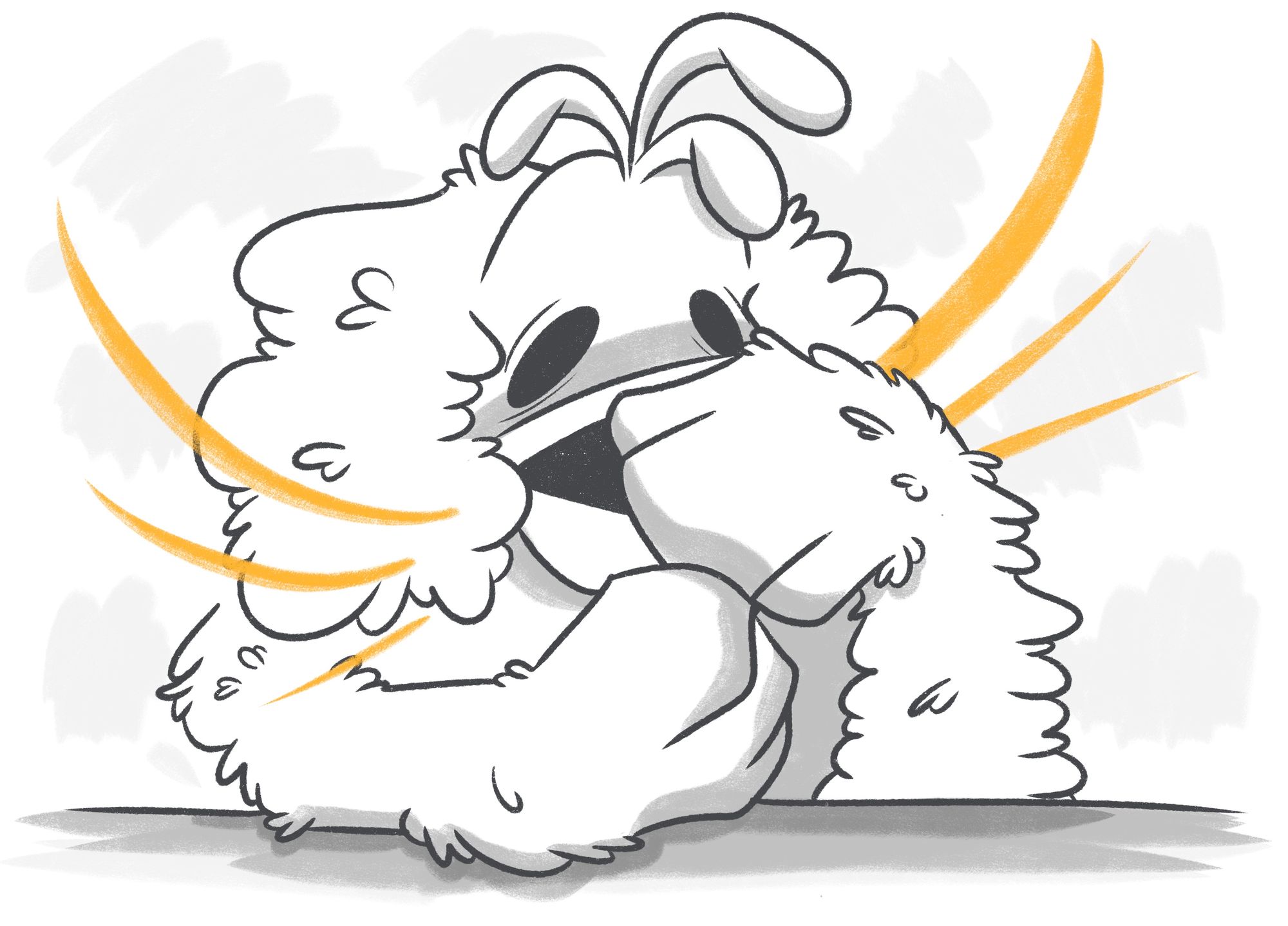Have you ever heard your dog make strange yet all-too-familiar sounds such as burping, farting, or stomach gurgling? Like the sounds our bodies produce when we’re gassy, dogs may also exhibit similar, if not the same, symptoms.
Hearing our dog make these sounds may make us giggle. However, if it happens frequently, it may be a symptom of a health issue. Let us get to know more about gas and burping in dogs below.
Content:
- Can Dogs Burp
- Why Is My Dog Gassy
- Home Remedies for Dog Gas Relief
- What Should I Feed My Dog With Gas
- Which Dog Breeds Are the Gassiest
- FAQ
- Conclusion
Can Dogs Burp
Akin to us humans, dogs may also burp or belch in the process of passing extra air or gas, along with symptoms such as borborygmus and flatulence. In some cases, the air builds up in your dog’s esophagus (without reaching their stomach), and they release it by burping.
Stop Googling - Ask a Real Vet
On the other hand, burping may come from the gastrointestinal tract when alkaline foods (foods with a high pH level), stomach acids, and digestive enzymes interact.
The most common reason for burping in dogs is aerophagia, which happens when a dog swallows too much air. For example, when dogs gulp their food quickly, they may burp to release the air that they have swallowed by accident along with their food.
Brachycephalic dog breeds such as pugs and bulldogs may be more prone to swallowing air and burping due to their short snouts.
Occasional dog burping is not a cause for alarm. However, if your dog burps a lot, it’s best to have them checked with their veterinarian to determine whether it's due to a medical condition.
Why Is My Dog Gassy
Among the possible reasons why your dog has excessive gas are:
Diet
Diet often plays a huge role in explaining why a dog has excessive gas, especially when their food contains a lot of indigestible ingredients. Meanwhile, a sudden change in diet without proper transitioning may also cause gas or diarrhea.
Ingesting trash or inappropriate food
"Why does my dog have gas all of a sudden?" you might be wondering. Another possible reason for extra gas is that your dog may have ingested trash or inappropriate food.
Being naturally curious, dogs can ingest certain things that they manage to find during walks or after having rummaged through the trash bin. In their search, they may ingest something inappropriate that doesn’t sit well with their stomachs.
Aerophagia
As was mentioned earlier, this phenomenon occurs when dogs swallow too much air, often when eating or drinking too fast. The air is usually released by burping, otherwise, it goes out as a dog fart. Brachycephalic breeds are more prone to aerophagia since they breathe using their mouths more than their noses.
Allergies
Like humans, dogs may also be susceptible to food allergies or stomach sensitivities that may cause vomiting, diarrhea, and gas. Along with digestive symptoms, dogs with allergies may also exhibit signs such as itchiness, facial swelling, hives, loss of hair, and chronic paw or ear infections.
Medical conditions
If your dog is gassy, it may also be due to the following medical conditions:
Exocrine pancreatic insufficiency (EPI)
"My dog keeps farting, and it smells really bad." This excess gas may be due to a condition called exocrine pancreatic insufficiency. This occurs when dogs are unable to produce pancreatic enzymes that are vital in digesting carbohydrates, fats, and protein, which often results in weight loss. Gassiness in your dog is a common symptom caused by a buildup of undigested food that reaches the colon and bacteria that produce gas.
Inflammatory bowel disease (IBD) and Colitis
These are gastrointestinal disorders that involve chronic inflammation of the stomach, the colon, and/or the small intestine. As a result, inflammation of the gastrointestinal tract lining occurs, leading to vomiting, diarrhea, and weight loss due to improper digestion of nutrients.
Intestinal parasites
Different intestinal parasites, such as roundworms, may cause issues in the digestive system of dogs, which may include excess gas.
Pancreatitis
This is associated with an inflamed pancreas that causes diarrhea, vomiting, abdominal pain, appetite loss, and gas.
Gastrointestinal tumors/growths
Dogs may also be susceptible to gastrointestinal tumors or growths, which may include symptoms such as gas, diarrhea, and vomiting.
It may be healthy for a dog to pass gas occasionally. However, too much gas may indicate gastrointestinal problems that may cause symptoms such as dog farts that smell bad, stomach gurgling, burping, vomiting, diarrhea, weight loss, and lack of appetite, among others.
Detecting and addressing symptoms early on goes a long way toward preventing the progression of gastrointestinal diseases and other diseases. With the help of a good pet camera, such as the Petcube Cam, you can monitor your dog 24/7 and detect anything that seems amiss. That way, you’ll be able to look out for your dog and have them checked with a veterinarian as soon as you notice symptoms.
Home Remedies for Dog Gas Relief

Immediate Home Remedies
Gas problems may cause your dog discomfort and pain, so it is best to provide your dog with relief as early as possible. Here are some immediate home remedies that may benefit your dog:
-
A warm bath
This may help in the better functioning of the intestines and provide relief from gas. You may also massage your dog during a warm bath for even better relief. -
A belly massage
Giving your dog a belly massage may help get the gas moving and give your dog comfort. -
Probiotics
The good bacteria contained in probiotics may help address your dog’s gut health and provide some gas relief.
Long-term Home Remedies
While immediate home remedies may help, long-term ones are necessary to fix your dog’s gut health issues.
-
Diet
If you feed your dog a poor diet, their gut health, along with many other aspects of their health, may suffer. Feeding your dog high-quality food that doesn’t include many indigestible ingredients is vital. Also, note that when it comes to changing their diet, there should be a transition period of around 7–10 days to prevent any stomach issues. -
Keep your dog’s environment clean
If your dog tends to sniff around the trash bin, consider trash cans with secure lids that you can close. During walks, be mindful of what your dog sniffs and steer them away from any food or trash that may be lying around the street. -
Slow feeding
If your dog tends to eat or drink fast, you may want to consider slow-feeding bowls such as those with puzzles and raised centers. This encourages your dog to eat slower while also providing mental stimulation. Alternatively, you may also try feeding smaller and more frequent meals throughout the day.
What Should I Feed My Dog With Gas
It’s important to consider what to feed a dog with gas issues. So what is the best food to feed dogs with gas? Generally, feeding a high-quality, balanced, and complete diet that is high in protein and low in carbohydrates may help manage and prevent gas issues.
A limited but high-quality ingredient list with less or no preservatives is ideal. If the ingredient list contains many items that you don’t recognize, it may be a red flag.
Which Dog Breeds Are the Gassiest

While there are a variety of factors to consider, here are some of the dog breeds that have a reputation for being gassy:
- English Bulldogs;
- Pugs;
- Golden Retrievers;
- Doberman Pinschers;
- Beagles;
- Yorkshire Terriers.
FAQ
How to massage gas out of a dog?
What you can do is use the palm of your hand and gently stroke your dog’s abdomen in a circular motion. Doing so may help get the gas moving. Make sure that both you and your dog are in a comfortable position for better results.
How long should a dog rest after eating to prevent bloat?
After every meal, vets agree that dog owners should wait for at least 2 hours before walking or exercising their dogs to prevent bloating and other gastric issues.
How often do dogs fart?
It depends, as some dogs fart more frequently than others. However, if your dog is farting too much or if you notice that their fart smells stinkier than normal, it's best to have them checked out by a vet.
Conclusion
It’s common to hear dogs burp, fart, and make stomach-gurgling noises on occasion. However, when it happens repeatedly, it may point to a gastrointestinal issue.
Managing your dog's diet and eating habits may help address flatulence and gas issues. Home remedies may also be considered to get the gas moving. If you're worried about your dog passing gas, it's always best to consult with your veterinarian for a proper diagnosis and to determine the best way to treat the issue.
Was this article helpful?
Help us make our articles even better









